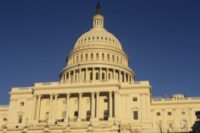 As it has in the past, the White House is calling for the elimination of funding for the National Institute for Occupational Safety and Health’s (NIOSH) Education and Research Centers (ERCs) as well as its Agriculture, Forestry, and Fishing (AFF) program.
As it has in the past, the White House is calling for the elimination of funding for the National Institute for Occupational Safety and Health’s (NIOSH) Education and Research Centers (ERCs) as well as its Agriculture, Forestry, and Fishing (AFF) program.
In the proposed budget Present Obama presented last week to Congress, those changes would represent a 15 percent reduction in NIOSH’s FY2016 budget, which would total $283 million.
Previous calls for the elimination of ERC and AFF funding have been met with protests by the occupational safety and health community.
Dangerous industries
Although the fatality and injury rates in sectors covered under AFF programs remain high, NIOSH says its efforts have contributed to reductions in both categories over the last 10-15 years largely through the accomplishment of intermediate outcomes.
Currently, NIOSH and its grantees in the AgFF sector are working on a combined total of more 40 research projects in areas such as pesticide exposure, agricultural surveillance, “smart clothing” for loggers and forest workers, and improving vessel stability. Funding for these projects also supports approximately 135 full-time NIOSH employees and extramural grantees.
Defunding effects
In a letter sent earlier this year to congressional leaders, Friends of NIOSH - a coalition of industry, labor, professional, educational, and scientific organizations – urged Congress to maintain funding for the programs, saying their elimination “would limit the ability of workers to avoid exposures that can result in injury or illnesses, push back improved working conditions, eliminate occupational safety and health educational services to over 10,000 U.S. businesses, and ultimately raise healthcare costs.”
OSHA gets a raise
Under the budget proposal, OSHA would get $592,071,000 – an increase of $39,284,000 over FY2015. The proposal increases federal enforcement by $17.6 million, raising it to $225.6 million. According to American Industrial Hygiene Association (AIHA) Government Affairs Director Aaron Trippler, the largest increase, percentage-wise, would go to whistleblower programs, which would get an additional $5.1 million (about a 30% increase).
“Every category shows an increase except for state compliance assistance which shows no increase from ’15. Interesting in that a lot of the increase is for more full-time equivalents (FTEs)," said Trippler.
He added that the overall federal budget "is likely DOA.
“This is always just the first figure to be thrown out there, and now Congress begins its debates. We are a long ways from anything. Remember, we haven’t even had a real budget the last 3-4 years, simply an omnibus bill.”



